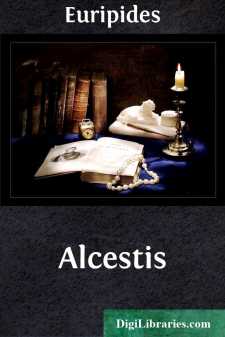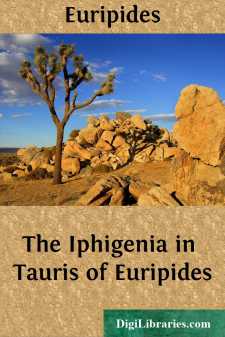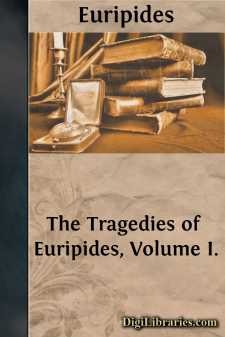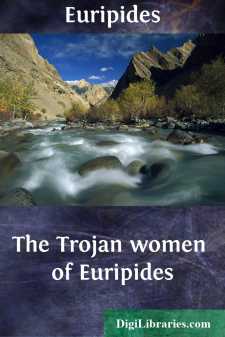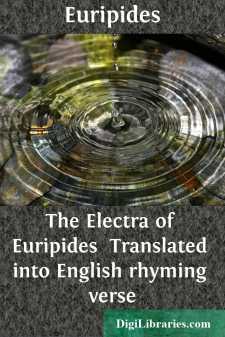Categories
- Antiques & Collectibles 13
- Architecture 36
- Art 48
- Bibles 22
- Biography & Autobiography 813
- Body, Mind & Spirit 142
- Business & Economics 28
- Children's Books 14
- Children's Fiction 11
- Computers 4
- Cooking 94
- Crafts & Hobbies 4
- Drama 346
- Education 46
- Family & Relationships 57
- Fiction 11829
- Games 19
- Gardening 17
- Health & Fitness 34
- History 1377
- House & Home 1
- Humor 147
- Juvenile Fiction 1873
- Juvenile Nonfiction 202
- Language Arts & Disciplines 88
- Law 16
- Literary Collections 686
- Literary Criticism 179
- Mathematics 13
- Medical 41
- Music 40
- Nature 179
- Non-Classifiable 1768
- Performing Arts 7
- Periodicals 1453
- Philosophy 64
- Photography 2
- Poetry 896
- Political Science 203
- Psychology 42
- Reference 154
- Religion 513
- Science 126
- Self-Help 84
- Social Science 81
- Sports & Recreation 34
- Study Aids 3
- Technology & Engineering 59
- Transportation 23
- Travel 463
- True Crime 29
Alcestis
by: Euripides
Categories:
Description:
Excerpt
ALCESTIS
CHARACTERS OF THE PLAY
ADMÊTUS, King of Pherae in Thessaly.
ALCESTIS, daughter of Pelias, his wife.
PHERÊS, his father, formerly King but now in retirement.
TWO CHILDREN, his son and daughter.
A MANSERVANT in his house.
A HANDMAID.
The Hero HERACLES.
The God APOLLO.
THANÁTOS or DEATH.
CHORUS, consisting of Elders of Pherae.
"The play was first performed when Glaukînos was Archon, in the 2nd year of the 85th Olympiad (438 B.C.). Sophocles was first, Euripides second with the Cretan Women, Alcmaeon in Psophis, Telephus and Alcestis…. The play is somewhat Satyric in character."
The scene represents the ancient Castle of ADMETUS near Pherae in Thessaly. It is the dusk before dawn; APOLLO, radiant in the darkness, looks at the Castle.
APOLLO.
Admetus' House! 'Twas here I bowed my head
Of old, and chafed not at the bondman's bread,
Though born in heaven. Aye, Zeus to death had hurled
My son, Asclepios, Healer of the World,
Piercing with fire his heart; and in mine ire
I slew his Cyclop churls, who forged the fire.
Whereat Zeus cast me forth to bear the yoke
Of service to a mortal. To this folk
I came, and watched a stranger's herd for pay,
And all his house I have prospered to this day.
For innocent was the Lord I chanced upon
And clean as mine own heart, King Pheres' son,
Admetus. Him I rescued from the grave,
Beguiling the Grey Sisters till they gave
A great oath that Admetus should go free,
Would he but pay to Them Below in fee
Another living soul. Long did he prove
All that were his, and all that owed him love,
But never a soul he found would yield up life
And leave the sunlight for him, save his wife:
Who, even now, down the long galleries
Is borne, death-wounded; for this day it is
She needs must pass out of the light and die.
And, seeing the stain of death must not come nigh
My radiance, I must leave this house I love.
But ha! The Headsman of the Pit, above
Earth's floor, to ravish her! Aye, long and late
He hath watched, and cometh at the fall of fate.
Enter from the other side THANATOS; a crouching black-haired and winged figure, carrying a drawn sword. He starts in revulsion on seeing APOLLO.
THANATOS.
Aha!
Why here? What mak'st thou at the gate,
Thou Thing of Light? Wilt overtread
The eternal judgment, and abate
And spoil the portions of the dead?
'Tis not enough for thee to have blocked
In other days Admetus' doom
With craft of magic wine, which mocked
The three grey Sisters of the Tomb;
But now once more
I see thee stand at watch, and shake
That arrow-armèd hand to make
This woman thine, who swore, who swore,
To die now for her husband's sake.
APOLLO.
Fear not.
I bring fair words and seek but what is just.
THANATOS (sneering)
And if words help thee not, an arrow must?
APOLLO.
'Tis ever my delight to bear this bow.
THANATOS.
And aid this house unjustly? Aye, 'tis so.
APOLLO.
I love this man, and grieve for his dismay.
THANATOS.
And now wilt rob me of my second prey!
APOLLO.
I never robbed thee, neither then nor now....


